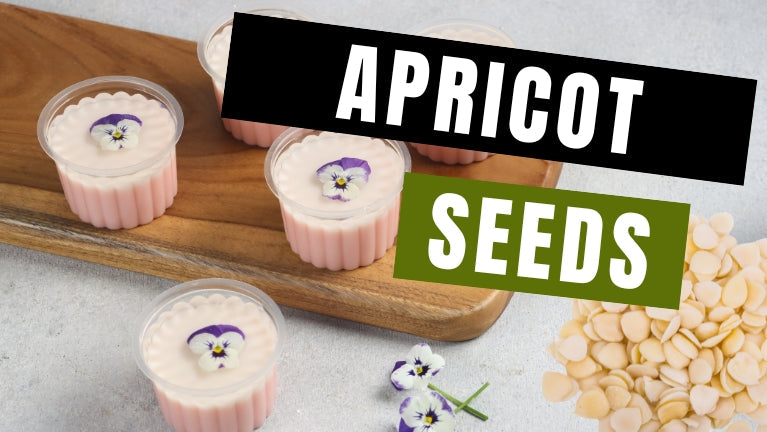
Dried apricot seeds, 杏仁, or Xing Ren, are the seeds found inside the apricot fruit. They are also known as bitter almonds. These seeds have a mild almond-like flavour, but they are distinctively bitter. They can be sweetened by mixing with other ingredients such as almonds and fruits. Apricot seeds have been used for centuries in TCM as a traditional remedy for various health issues, owing to their diverse chemical composition.
Apricot seeds can be consumed in various forms in TCM and have many potential health benefits.
What are Apricot Seeds/ Xing Ren?

Apricot trees are native to China, and their fruit and seeds have been consumed for centuries as a food source and in various herbal formulations to address health issues.
Apricot seeds have a bitter taste, which is associated with the Metal element and the Lung and Large Intestine organ systems in TCM. The bitter taste of Xing Ren was believed to have qualities that could clear heat, resolve phlegm, and benefit the respiratory and digestive systems.
The specific applications vary depending on the patient's individual constitution and the diagnosis made by a TCM practitioner. Apricot seeds are still used in TCM and herbal medicine practices; however, it's important to note that the use of apricot seeds, especially in their raw form, should be approached with caution due to the presence of amygdalin, which can release cyanide when consumed in excess, so please seek advice from your local practitioner before consuming.
What are the Health Benefits of Apricot Seeds?

1. Respiratory Health: Xing Ren has been traditionally used in TCM to alleviate respiratory conditions such as coughs, asthma, and bronchitis. The seeds are believed to have the ability to soothe the respiratory tract and help clear phlegm and mucus.
2. Digestive Health: Apricot seeds are thought to aid in digestion and relieve symptoms of indigestion. Some TCM practitioners suggest that they can help regulate bowel movements.
3. Moistening the Lungs: In TCM, apricot seeds are believed to moisten the lungs, which can be especially beneficial in dry climates or during the winter months when the air is dry. Moistening the lungs may help prevent or alleviate dry throat and cough.
4. Detoxification: Xing Ren is thought to have detoxifying properties. It is believed to help the body eliminate harmful toxins, promoting overall health.
5. Emotional Wellness: In TCM, apricot seeds are also associated with the ability to calm the mind and reduce stress. This is attributed to their potential to balance the body's energy, or Qi.
How Can I Use Them?

Apricot seeds can be consumed in various forms:
1. Cooking: Cooking or roasting apricot seeds can help reduce their bitterness while retaining their health benefits. They can be roasted and used in recipes, like stir-fries or soups.
2. Herbal Formulations: Xing Ren is often used in TCM herbal formulations, combined with other herbs to create a holistic remedy tailored to specific health needs.
3. Apricot Seed Oil: Apricot seed oil, extracted from the seeds, is used for massage and skin care. It's rich in essential fatty acids and can be beneficial for moisturising and nourishing the skin.
4. Apricot Seed Tea: Apricot seed tea is made by steeping crushed or roasted apricot seeds in hot water. This is a soothing drink that may help with respiratory and digestive issues.
4. Traditional apricot seed milk: Often referred to as "Xing ren nu," it is a popular beverage in some regions of China and Asia. It is made from apricot seeds (Xing ren), and its preparation involves grinding or blending the seeds to create a creamy, milky beverage.
Remember that apricot seeds must be consumed in moderation; please seek your local TCM practitioner for advice.

Where Can I Buy Apricot Seeds?
Dried Apricot Seeds 杏仁 (Xing Ren) | (500g)
Summary

So, while apricot seeds are predominantly recognised for their bitterness, their potential to balance and support the digestive system can be seen as having a "sweet" aspect in the context of TCM, where flavours are evaluated not only for their taste but also for their influence on the body's energies and organ systems. This showcases the nuanced and holistic approach to health and wellness that Traditional Chinese Medicine adopts.
Shop Large Loose Herbs Here
For any further queries regarding our herbs or any of our products, please email info@vitaherbalnutrition.com and we'll be happy to help.
